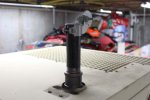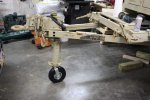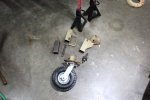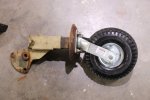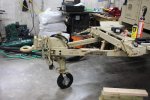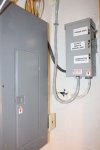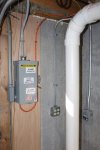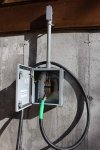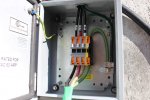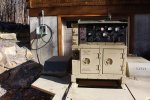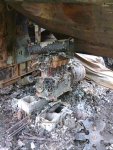Thought I would update a little bit with some details on the Aux fuel tank I have added to my generator...
So basically I wanted to add more fuel storage for the generator so I can be prepared to run it for power outages up to a week without re-fueling. I looked at transfer tanks... then I looked at aux fuel tanks for pickups.. And finally settled on getting a used fuel tank from a semi truck. Found a local junkyard that has heavy equipment and found a nice sized tank from a Volvo truck. I believe it is a Volvo VNL model. The tank data sticker was worn off the tank so I do not know exact fuel capacity but calculations show it to be about 50 gallons.
I actually got a different tank before this one that was off of a reefer trailer. 50 gallon capacity but different shape but unfortunately it was too far gone. There were a couple holes.. epoxy patches.. etc. Took it back and got the tank I have now. The tank I have now had a good 1/4 inch of thick sludge in the bottom of it and had a bio diesel sticker on the outside so I assume it was partially due to bio diesel use. Several days of letting 100% strength purple power work its magic and all of the sludge was finally gone. I sanded the exterior and then pressure tested it for any leaks. all good!
Next step I painted the original mounting arms and decided to mount them to the front deck of the trailer. In order to still have reasonable access to the output terminals and storage door I moved the front deck plate forward and re-drilled new mounting holes and used new hardware to mount it. Got all 1/2" grade 8 hardware from tractor supply since they sell by the pound for a good price.
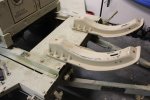
With the support arms mounted to the front of the trailer there I can jump on the ends of the arms and the deck plate will flex somewhat. a section of 2x4 between the plate and front frame rail fit nicely and added extra support. The full tank should weigh about 400lbs so It should be strong enough for that kind of weight. I am 200lbs and I can jump on the very ends of those arms.
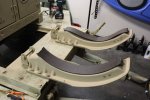
I also bolted down some other anchor points for the ratchet straps behind the arms. Since the original tank straps were rusted out I decided to toss them and use some ratchet straps instead. The only time I plan on taking this setup down the road is to fuel up the tank and I feel comfortable with the two straps it will not go anywhere. I also tossed the old rubber that the tank mounted on so instead of buying more rubber I used instead 3 strips of 40# tar paper to pad the tank on the supports.
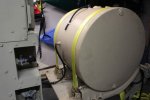
Tank mounted and strapped down. One end of the straps goes to the anchor brackets I bolted onto the deck and the other end with the ratchet hooks onto the rear underside of the support arms. The hose on the top of the tank is the vent valve/hose The hose coming out of the side is the fuel pickup and there is a pickup tube inside the tank that goes to about an inch off the bottom.
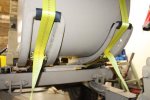
The ratchet part of the straps fits perfectly under the support arms when closed. I put a small section of rubber hose on the tips of the support arms to prevent any chafing of the straps on the metal.
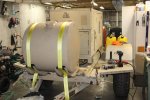
I still need to tie back the extra strap material or cut it off. I know the extra weight on the front of the trailer will probably make it too heavy to pick up and put onto my pintle hook but I will probably get a hi-lift for that purpose. Since I already added a wheel to the front leg it will still be able to roll around!
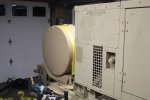
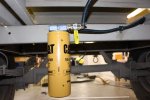
I wanted to add in some sort of filtration for fuel leaving the storage tank. I had a hard time deciding if I wanted do a filter or a water separator but I just decided on a filter only. The CAT filters seem to be pretty popular among diesel truck guys so I installed a WIX filter base and the fuel filter which is good down to 2 micron filtration. Also added in a shutoff valve for filter changes or to just shut off the supply. I bolted the filter to the first cross member under the trailer. Since the 37" tires leave plenty of clearance its easy to service underneath. The fuel line is 3/8" rubber fuel hose. I ran it along the frame rail under the generator and secured it with some nice clamps. I saw some info saying not to use brass fittings for diesel due to corrosion issues but I already had all of the fittings I needed and even some of the stock fittings on the generator are brass so I figured what the heck.
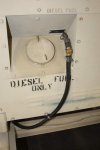
I did have a hard time finding the right -5AN fitting for the aux fuel inlet. I eventually found what I needed at my work place..a small pipe attached to a hydraulic test gauge. I had to tap one of the 1/4" NPS fittings into NPT for my 45 degree elbow but everything fits up perfect.
Next step is fuel it up and get the aux pump to draw some fuel! And some more touch up painting... I made some stencils to spray on diesel fuel only onto the tank (you can see I tested it on the generator.. and did a poor job at that)


